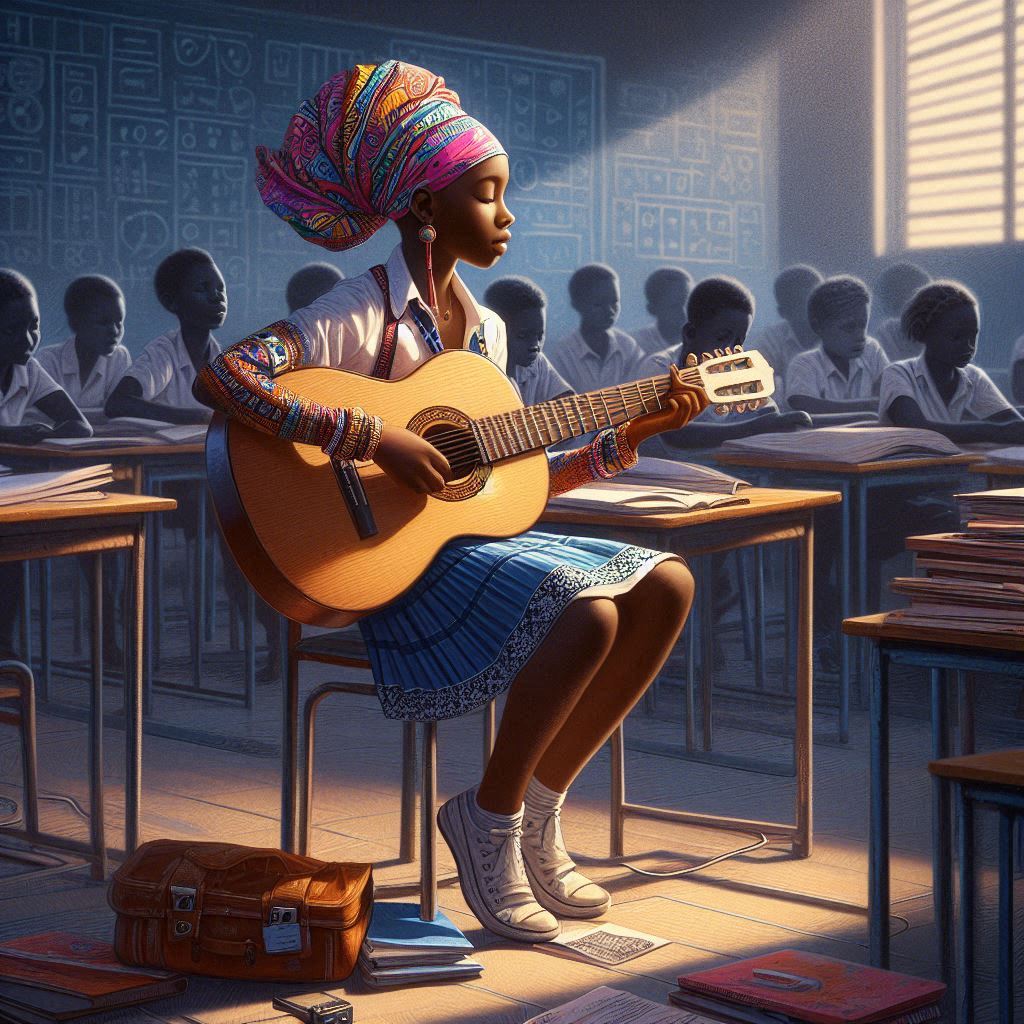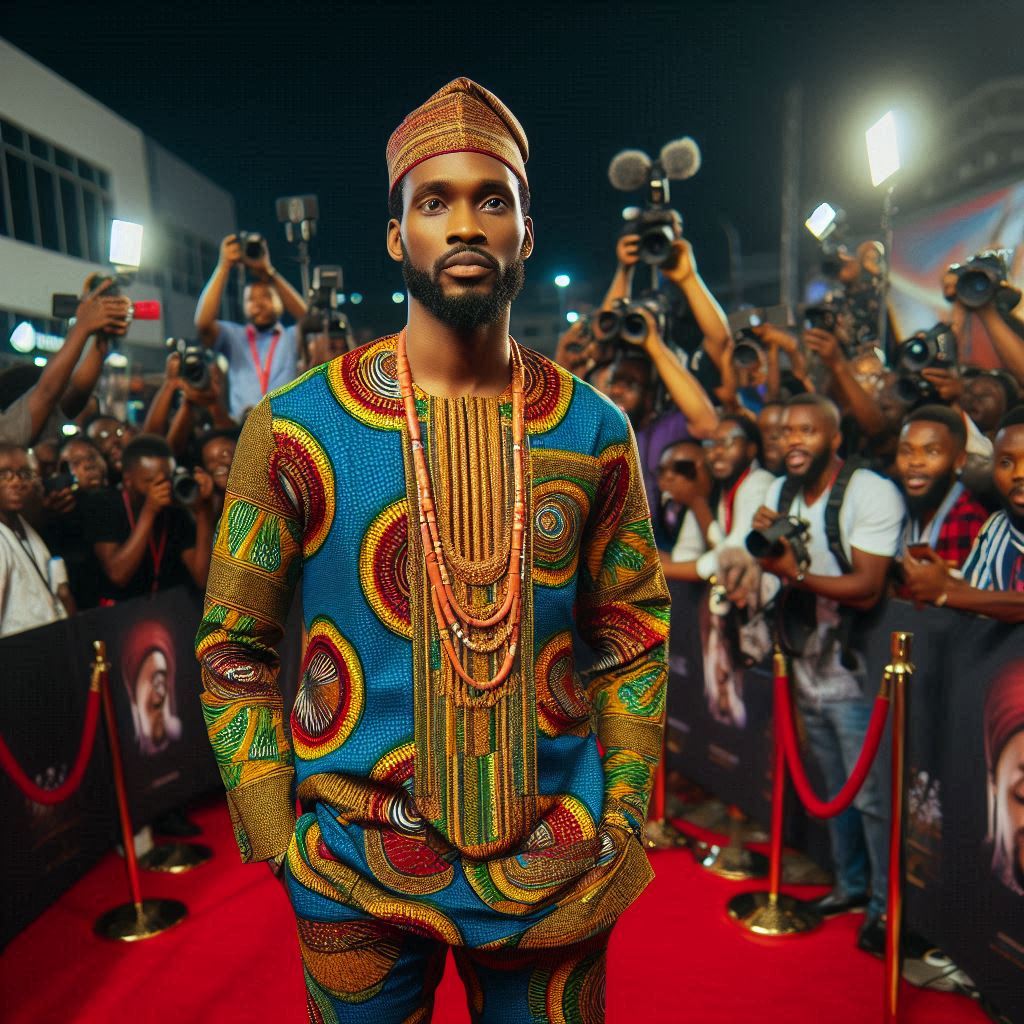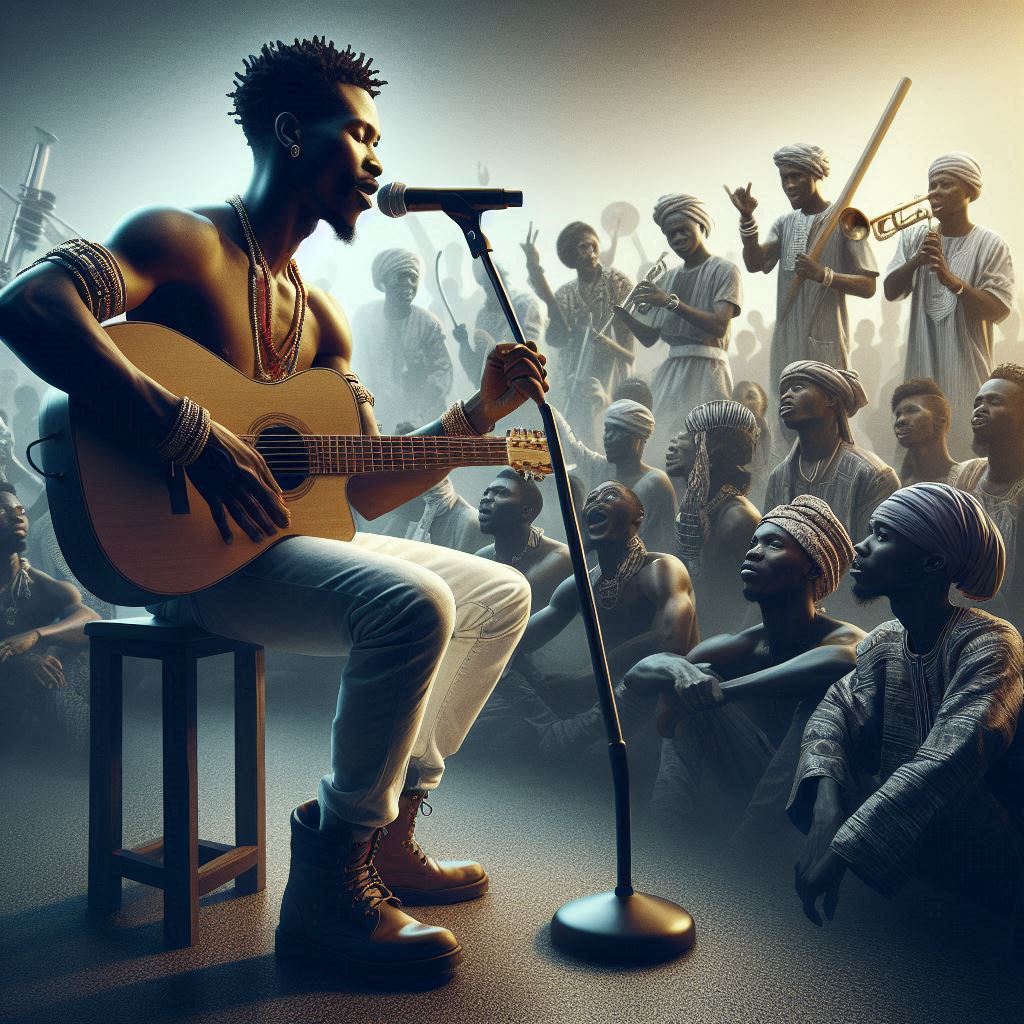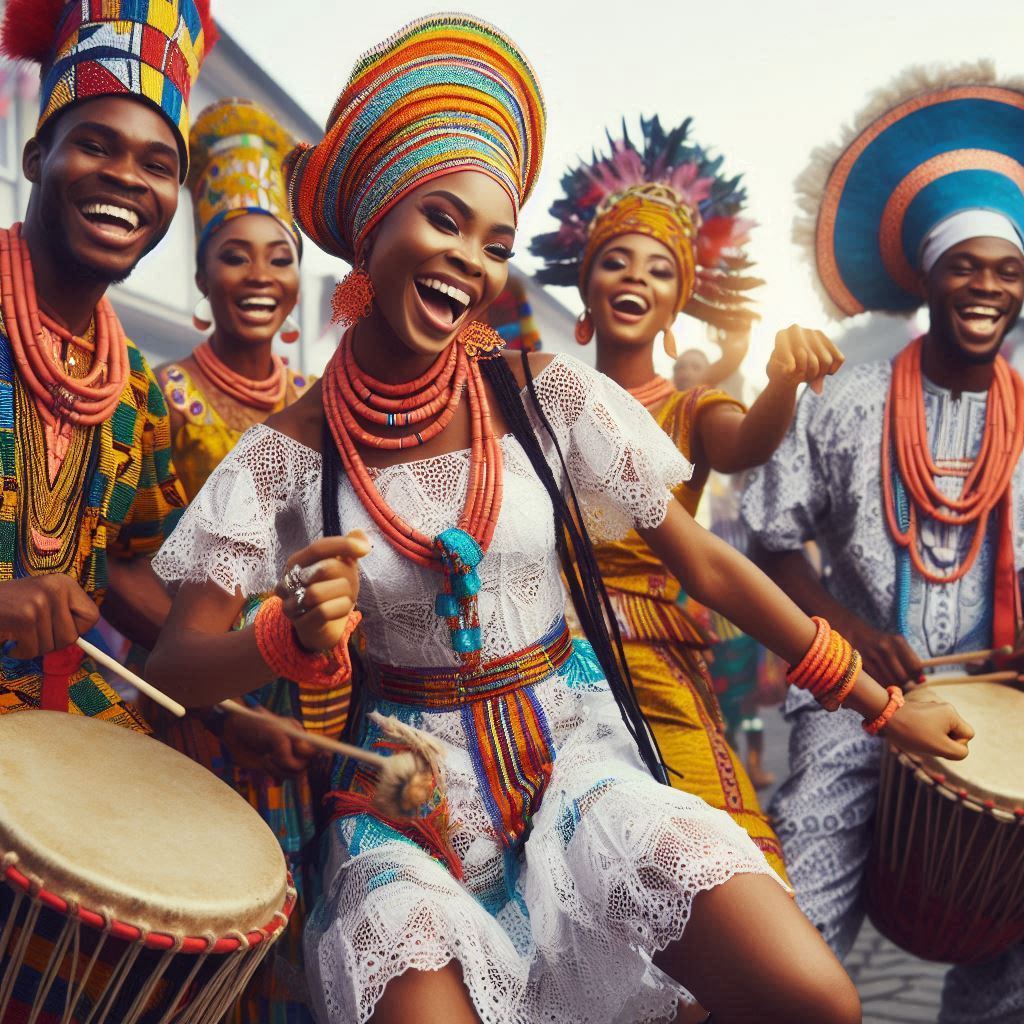Introduction
The history of performing arts in Nigeria is rich and diverse. This blog section provides an overview of its evolution and importance in Nigerian culture.
Brief Overview of the History of Performing Arts in Nigeria
Performing arts in Nigeria have deep roots in traditional African rituals and ceremonies. Indigenous communities used dance, music, and drama to communicate and preserve their cultural heritage.
These art forms were essential in storytelling, passing down history, and teaching moral lessons.
In pre-colonial Nigeria, each ethnic group had unique performance styles. The Yoruba people were known for their elaborate masquerade dances.
The Igbo celebrated through vibrant festivals and traditional music. The Hausa-Fulani showcased their heritage through storytelling and rhythmic drumming.
Colonialism brought significant changes to Nigerian performing arts. European influence introduced new performance styles and instruments.
However, traditional forms remained resilient, adapting to incorporate new elements while retaining their essence.
The 20th century saw a renaissance in Nigerian performing arts. Post-independence, there was a resurgence in traditional forms, now blended with contemporary influences.
Pioneers like Hubert Ogunde revolutionized Nigerian theatre. Ogunde’s productions addressed social issues, blending drama with traditional music and dance.
Today, Nigeria boasts a vibrant performing arts scene. Nollywood, the country’s film industry, is a global powerhouse. Traditional festivals like Osun-Osogbo and Argungu Fishing Festival attract international attention.
Contemporary musicians like Fela Kuti and Burna Boy have achieved worldwide acclaim.
Importance of Performing Arts in Nigerian Culture
Performing arts are integral to Nigerian culture. They serve as a medium for cultural expression and identity. Through dance, music, and drama, Nigerians celebrate their heritage and convey important cultural narratives.
Traditional ceremonies and festivals rely heavily on performing arts. These events bring communities together, fostering unity and social cohesion. They are opportunities for cultural exchange and preservation of indigenous practices.
Performing arts also play a crucial role in education. They teach younger generations about their history, values, and traditions. Folk tales, enacted through drama and music, impart moral lessons and wisdom.
In Nigeria, performing arts are a powerful tool for social commentary. Artists address societal issues, challenging norms and sparking dialogue. Theatre and music have been used to advocate for political change and social justice.
Economically, performing arts contribute significantly to Nigeria’s GDP. The entertainment industry provides employment for thousands. It attracts tourism and investment, showcasing Nigeria’s rich cultural heritage to the world.
Performing arts enhance national pride and identity. They highlight Nigeria’s diversity and creativity on the global stage.
From traditional performances to contemporary innovations, Nigerian performing arts continue to evolve and inspire.
In review, the history of performing arts in Nigeria is a testament to the country’s cultural richness and resilience. Its importance in Nigerian culture cannot be overstated.
Through performing arts, Nigeria celebrates its past, navigates its present, and envisions its future.
Traditional Nigerian Performing Arts
Overview of Traditional Dance, Music, and Theatre in Nigeria
Traditional Nigerian performing arts showcase the rich cultural diversity of the nation. Each ethnic group boasts unique artistic expressions.
Traditional dance, music, and theatre play vital roles in Nigerian society. They serve as mediums for storytelling, celebration, and social commentary.
Traditional dances are vibrant, rhythmic, and deeply symbolic. They often involve intricate footwork and expressive movements. These dances are typically performed during festivals, ceremonies, and communal gatherings.
They reflect the values, beliefs, and history of the community.
Music in Nigeria is equally diverse and integral to the culture. Traditional music features indigenous instruments like the talking drum, dundun, and shekere.
These instruments produce distinctive sounds that resonate with the soul of the people. Musicians often sing in local dialects, conveying messages and preserving oral traditions.
Traditional theatre combines dance, music, and dramatic performances. It often involves elaborate costumes, masks, and props.
These performances narrate folktales, historical events, and moral lessons. They engage the audience through humor, drama, and interactive elements.
Examples of Popular Traditional Performances
Nigeria is home to numerous traditional performances that are celebrated nationwide. One of the most renowned is the Egungun festival among the Yoruba people.
This festival honors ancestors with masquerade performances. The masqueraders, adorned in vibrant costumes, dance energetically to the rhythm of drums.
The Igbo people celebrate the New Yam Festival with the Ijele masquerade. The Ijele masquerade is the largest and most complex mask in Africa. Performers wear it during the festival to symbolize the importance of the yam crop.
Among the Hausa-Fulani, the Durbar festival stands out. This festival marks the end of Ramadan and features a grand parade of horsemen.
Riders display their skills in a breathtaking equestrian performance, accompanied by traditional music.
The Tiv people of Benue State perform the Swange dance. This dance is characterized by swift footwork and graceful body movements.
It is performed during various cultural events and ceremonies, celebrating the Tiv heritage.
Influence of Indigenous Cultures on Nigerian Performing Arts
Indigenous cultures profoundly influence Nigerian performing arts. Each ethnic group contributes distinct elements to the national artistic landscape.
The Yoruba culture, for example, influences the dramatic and symbolic nature of many performances. Yoruba dances often involve complex storytelling through movements and gestures.
Igbo culture emphasizes the role of masquerades and ancestral veneration. This influence is evident in the elaborate costumes and spiritual themes in Igbo performances.
The music often features polyrhythmic drumming and call-and-response singing.
The Hausa-Fulani culture brings a unique blend of music and equestrian displays. Their performances often highlight Islamic influences, reflecting the region’s religious heritage.
The music features traditional instruments like the kakaki and algaita.
The diverse cultural influences enrich Nigerian performing arts, creating a vibrant and dynamic artistic tradition.
These performances continue to evolve, incorporating contemporary elements while preserving their traditional roots. Traditional Nigerian performing arts remain a testament to the country’s rich cultural heritage and artistic creativity.
Read: The Role of Psychology in Nigerian Corporate Sector
Colonial Influence on Nigerian Performing Arts
Impact of Colonization on Nigerian Performing Arts
Colonization significantly transformed Nigerian performing arts. British colonial rule introduced new cultural elements. Traditional performances began to blend with foreign influences.
The British administration established schools that taught Western arts. This educational shift influenced Nigerian artists profoundly. New artistic forms emerged, combining local and foreign styles.
Nigerian performing arts evolved in response to these changes. Traditional art forms adapted to fit new contexts. Colonialism created a hybrid artistic identity in Nigeria. This transformation impacted music, dance, and theatre significantly.
Introduction of Western Theatre and Music in Nigeria
Western theatre and music entered Nigeria through colonial education. Missionaries played a key role in this process. They introduced Western religious music and drama.
Nigerian schools started teaching Western theatrical techniques. This education encouraged a new genre of performances. Nigerian artists began to explore Western narratives.
This exploration led to the creation of hybrid performances. Western instruments and musical styles became popular.
These new influences blended with traditional Nigerian music. The introduction of Western arts opened new creative possibilities.
Changes in Traditional Performances Due to Colonial Rule
Colonial rule brought significant changes to traditional performances. Many traditional practices were altered or abandoned. Colonial authorities often suppressed certain cultural expressions.
They viewed some performances as pagan or uncivilized. This suppression forced artists to modify their work. Traditional performances began to incorporate Western elements.
This incorporation created unique, blended art forms. Dance and music evolved to reflect new realities. Performers adapted to meet changing audience expectations. Colonial rule reshaped the landscape of Nigerian performing arts.
Traditional festivals also experienced transformation. Colonial influence altered the content and style of these events. New performance venues emerged during this period.
These venues hosted a variety of cultural activities. Performers had to adjust to different settings. Urbanization, driven by colonial policies, influenced artistic trends.
City life introduced new themes and stories into performances. Traditional rural themes gave way to urban narratives. This shift reflected broader societal changes.
In short, The colonial period had a profound impact on Nigerian performing arts. It introduced new artistic forms and techniques.
Traditional practices were transformed under colonial rule. Nigerian artists created innovative hybrid performances. These changes continue to influence Nigerian performing arts today.
The legacy of colonial influence is complex. It encompasses both suppression and creative adaptation. Nigerian performing arts emerged resilient and dynamic from this period.
They continue to evolve, drawing on a rich cultural heritage. The colonial era left an indelible mark on Nigeria’s artistic landscape. This period of transformation is crucial to understanding modern Nigerian performing arts.
Read: How to Start a Private Psychology Practice in Nigeria
Independence Era: Resurgence and Transformation of Nigerian Performing Arts
Resurgence of Interest in Traditional Nigerian Performing Arts
The independence of Nigeria in 1960 ignited a cultural renaissance. Traditional performing arts saw a significant resurgence. Nigerian communities rekindled interest in their indigenous art forms.
Music, dance, and drama rooted in tradition gained renewed popularity. Traditional festivals and ceremonies became vibrant once more. This resurgence was driven by a desire to reclaim cultural identity.
Colonial influence had previously overshadowed many indigenous practices. Post-independence, Nigerians eagerly revived their ancestral artistic expressions.
The Yoruba, Igbo, and Hausa communities led this revival. They showcased rich, diverse cultural heritages through performance arts. Traditional drumming, masquerades, and storytelling returned to prominence.
This period marked a significant cultural reawakening in Nigeria.
Establishment of National Theatre and Dance Groups
The Nigerian government recognized the importance of cultural heritage. In response, they established national theatre and dance groups.
The National Theatre in Lagos became a cultural hub. It hosted performances that celebrated Nigerian traditions. The government also formed the National Troupe of Nigeria.
This troupe performed traditional dances and dramas across the country. These groups aimed to preserve and promote Nigerian performing arts. They provided a platform for artists to showcase their talents.
The establishment of these groups marked a significant investment in the arts. It encouraged a new generation of performers and audiences. National theatre and dance groups played a crucial role.
They helped bridge the gap between tradition and modernity.
Influence of Nigerian Independence on Performing Arts Scene
Independence brought a wave of national pride. This pride deeply influenced the Nigerian performing arts scene. Artists began to explore themes of freedom and identity.
Theatre productions often reflected the struggles and triumphs of independence. Playwrights like Wole Soyinka gained international acclaim.
His works highlighted social and political issues in post-colonial Nigeria. Dance and music performances also reflected newfound freedom.
They incorporated elements of resistance and celebration. Nigerian independence fostered a sense of unity and purpose among artists.
It encouraged them to innovate while staying true to their roots. The performing arts became a means of expressing national identity.
They served as a tool for social commentary and change. Independence thus significantly shaped the evolution of Nigerian performing arts.
In a nutshell, The independence era was a transformative period for Nigerian performing arts. The resurgence of traditional arts rekindled cultural pride.
The establishment of national theatre and dance groups institutionalized this revival. Independence itself profoundly influenced artistic expression.
Nigerian performing arts flourished, blending tradition with contemporary themes. This era laid the foundation for a vibrant cultural landscape.
The legacy of independence continues to inspire Nigerian artists today. They honor their heritage while pushing creative boundaries. The performing arts remain a powerful expression of Nigeria’s rich cultural tapestry.
Read: Bridging the Gap in Nigerian Mental Health Services
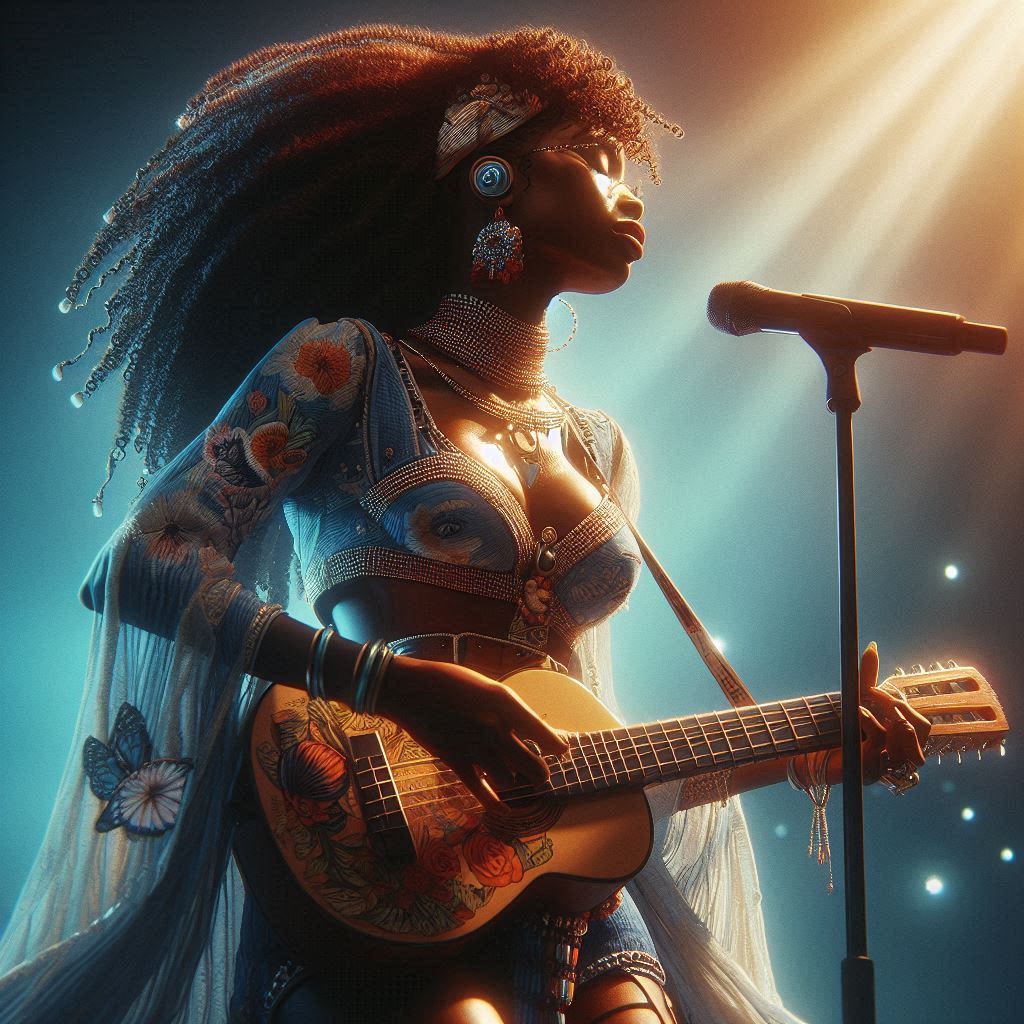
Contemporary Nigerian Performing Arts
Evolution of Nigerian Music, Dance, and Theatre in Modern Times
Nigerian performing arts have undergone significant transformation in recent decades. The country’s rich cultural heritage continues to inspire contemporary performances.
Nigerian music, dance, and theatre have embraced modern influences while retaining traditional elements. This evolution reflects the dynamic nature of Nigerian society.
Modern Nigerian music blends traditional rhythms with contemporary beats. Genres like Afrobeat, Afropop, and Afrofusion dominate the music scene.
Legendary musicians like Fela Kuti pioneered this movement. Today, artists like Burna Boy and Wizkid continue to innovate.
Dance in Nigeria has also evolved, incorporating both indigenous and global styles. Traditional dances like Bata and Atilogwu remain popular.
However, contemporary dancers now mix these with hip-hop, salsa, and other forms. Theatre in Nigeria has seen similar changes. Playwrights like Wole Soyinka set the stage for modern Nigerian drama.
Current theatre productions often address social and political issues. They also incorporate multimedia elements to engage audiences.
Fusion of Traditional and Western Styles in Nigerian Performances
The fusion of traditional and Western styles defines contemporary Nigerian performing arts. This blend creates unique and compelling performances.
Musicians integrate indigenous instruments with Western ones. For instance, the talking drum often accompanies electric guitars and synthesizers.
This combination produces a distinctive sound that appeals globally. Dance performances also showcase this fusion. Traditional movements are often paired with modern choreography. This blend captivates both local and international audiences.
Transform Your Career with Expert Guidance
Get personalized mentorship consulting that’s tailored to your unique path. Our expert advice is actionable and exclusive.
Get StartedTheatre productions reflect this cultural synthesis too. Modern plays frequently incorporate traditional storytelling techniques. They also use contemporary staging and special effects.
This approach preserves cultural heritage while embracing innovation. Nigerian artists adeptly navigate between these influences. Their performances reflect a deep respect for tradition and a forward-looking perspective.
This fusion has become a hallmark of Nigerian performing arts. It highlights the country’s cultural richness and adaptability.
Rise of Nigerian Performers on International Stage
Nigerian performers have gained significant recognition on the international stage. Musicians like Burna Boy, Tiwa Savage, and Davido have achieved global success.
They frequently collaborate with international artists. Their music is celebrated worldwide, earning awards and nominations. Nigerian dancers also shine internationally.
They participate in global competitions and workshops. Their performances receive acclaim for their energy and creativity.
Nigerian theatre has similarly garnered international attention. Playwrights like Wole Soyinka and Chimamanda Ngozi Adichie have won prestigious awards.
Their works are performed in theatres worldwide. Nigerian actors also excel in international film and theatre productions. This global presence underscores the talent and versatility of Nigerian performers.
It reflects the country’s vibrant cultural scene and creative potential. The international success of Nigerian artists enhances the country’s cultural diplomacy. It also inspires the next generation of performers.
In essence, Contemporary Nigerian performing arts continue to evolve and inspire. The fusion of traditional and Western styles creates unique and engaging performances.
Nigerian performers excel on the international stage, showcasing their talent and creativity. The future of Nigerian performing arts looks promising, with endless possibilities for innovation and growth.
Read: The Future of Psychology Education in Nigeria
Popular Nigerian Performing Artists
Profiles of Prominent Nigerian Actors, Musicians, and Dancers
Nigeria boasts many talented actors, musicians, and dancers who have gained international recognition. One prominent actor is Genevieve Nnaji. Genevieve Nnaji, often called the “Julia Roberts of Africa,” has starred in many films.
Her role in “Lionheart” marked Nigeria’s first Netflix original film. Another notable actor is Richard Mofe-Damijo (RMD). RMD has a remarkable career spanning over three decades in Nollywood.
He has won numerous awards and remains a beloved figure.
In the music scene, Fela Kuti is legendary. Fela Kuti, the pioneer of Afrobeat, used his music to fight social injustices. His influence remains profound in contemporary music globally.
Another influential musician is Burna Boy. Burna Boy has won several international awards and collaborates with global artists. Tiwa Savage, often called the “Queen of Afrobeats,” has significantly impacted the music industry.
She is known for her powerful voice and dynamic performances.
Nigeria’s dance industry also has stars like Kaffy. Kaffy, a dancer and choreographer, broke the Guinness World Record for the longest dance party. She has inspired many young dancers in Nigeria and beyond.
Contributions of Famous Nigerian Artists to the Performing Arts Industry
These artists have made significant contributions to the performing arts industry. Genevieve Nnaji has paved the way for other Nigerian actors on the global stage.
Her success has increased interest in Nollywood films worldwide. RMD’s extensive body of work showcases the depth and versatility of Nigerian actors. He continues to mentor young actors, fostering new talent in Nollywood.
Fela Kuti’s creation of Afrobeat revolutionized music. His innovative style blends traditional African rhythms with jazz and funk. This unique genre continues to influence artists worldwide.
Burna Boy’s music promotes African culture and addresses societal issues. His success has opened doors for other African artists in the global music industry.
Tiwa Savage’s music blends traditional African sounds with contemporary beats. She has inspired a new generation of female musicians in Nigeria.
Kaffy’s achievements in dance have brought global attention to Nigerian dance. Her choreographic work has elevated the art form and provided opportunities for many dancers.
Impact of Nigerian Performers on Global Culture
Nigerian performers have significantly impacted global culture. Genevieve Nnaji’s films have introduced international audiences to Nollywood.
Her work has helped change perceptions of African cinema. RMD’s performances have showcased the rich storytelling tradition of Nigeria. He has brought Nigerian narratives to a global audience.
Fela Kuti’s Afrobeat has become a global phenomenon. His music has influenced numerous international artists and music genres. Burna Boy’s global collaborations have brought Afrobeat to mainstream audiences.
He represents the modern face of African music. Tiwa Savage’s international success has highlighted the versatility and appeal of Afrobeats. Her music crosses cultural boundaries, resonating with fans worldwide.
Kaffy’s contributions to dance have showcased the vibrancy and creativity of Nigerian culture. Her work has inspired dancers globally and promoted Nigerian dance on an international stage.
These artists have not only achieved personal success but have also elevated Nigerian performing arts on the world stage. Their contributions continue to inspire and shape global culture.
Challenges Faced by Performing Artists in Nigeria
Performing artists in Nigeria encounter a multitude of challenges hindering their growth and development.
From financial constraints to inadequate support systems, these obstacles present significant hurdles to the flourishing of the performing arts industry in the country.
Lack of Funding for Arts Education and Training
Access to quality arts education and training is crucial for nurturing the talents of aspiring performing artists. However, in Nigeria, the shortage of funding for arts education programs remains a major concern.
Many schools lack the resources to provide comprehensive training in various performing arts disciplines such as music, dance, and theater.
As a result, talented individuals often struggle to receive formal training, limiting their potential for professional advancement.
Limited Government Support for Performing Arts Industry
The Nigerian government’s support for the performing arts industry is inadequate, exacerbating the challenges faced by artists.
Despite the cultural richness and diversity of Nigeria’s performing arts traditions, government funding and policies aimed at promoting and preserving these traditions are insufficient.
As a result, many talented performers lack the necessary resources and infrastructure to thrive in their craft.
Piracy and Copyright Issues Affecting Nigerian Artists
Piracy and copyright infringement pose significant threats to Nigerian artists, undermining their ability to earn a livelihood from their creative work.
The proliferation of pirated copies of music, films, and other artistic productions deprives artists of rightful compensation for their efforts.
Moreover, the lack of robust legal frameworks and enforcement mechanisms exacerbates the problem, leaving artists vulnerable to exploitation and financial losses.
Addressing the Challenges
To address these challenges, concerted efforts are needed from various stakeholders, including government agencies, educational institutions, and the private sector.
Government initiatives should prioritize increased funding for arts education programs, ensuring that aspiring performing artists have access to quality training and resources.
Additionally, policymakers must develop and implement policies that provide financial support and incentives for the performing arts industry, including grants, subsidies, and tax incentives for artists and arts organizations.
Furthermore, strengthening copyright laws and enforcement mechanisms is essential to combat piracy and protect the intellectual property rights of Nigerian artists.
This requires collaboration between government agencies, law enforcement authorities, and industry stakeholders to develop effective strategies for combating piracy and enforcing copyright laws.
In fact, while Nigerian performing artists face numerous challenges, concerted efforts to address these issues can help foster a more vibrant and sustainable performing arts industry in the country.
By investing in arts education, providing adequate government support, and addressing piracy and copyright issues, Nigeria can unlock the full potential of its rich cultural heritage and artistic talent.
Cultural Significance of Nigerian Performing Arts
Nigerian performing arts are more than mere entertainment; they serve as custodians of the nation’s rich heritage and traditions.
Through vibrant music, captivating dance, and compelling theater, these art forms encapsulate the essence of Nigerian identity.
Preserving Heritage and Traditions
Performing arts in Nigeria play a vital role in preserving the diverse cultural heritage of the nation.
Traditional dances, such as the energetic Bata dance of the Yoruba people or the graceful Ekombi dance of the Efik tribe, serve as living expressions of centuries-old customs and rituals.
Music, too, serves as a powerful vessel for cultural preservation.
Traditional instruments like the talking drum, the kora, and the shekere are not just musical tools but symbols of cultural continuity, passed down through generations.
Theater, with its storytelling prowess, also contributes to the preservation of Nigerian traditions.
Folk tales, myths, and legends are brought to life on stage, ensuring that oral traditions are not lost to time but instead thrive in contemporary settings.
Promotion of Unity and Diversity
In a nation as culturally diverse as Nigeria, performing arts serve as a unifying force, transcending ethnic and regional boundaries.
Through collaborative performances that incorporate elements from various cultural backgrounds, artists foster a sense of unity and mutual respect among Nigerians.
Dance troupes often blend movements from different ethnic groups, showcasing the beauty of diversity while celebrating shared humanity.
Similarly, music performances fuse traditional rhythms with modern sounds, creating harmonious melodies that resonate with people from all walks of life.
Theater productions, meanwhile, tackle universal themes that resonate with audiences across Nigeria.
Whether addressing social issues, historical events, or personal struggles, these performances offer a platform for dialogue and understanding, fostering empathy and solidarity among diverse communities.
Celebration of Nigerian Identity
Above all, Nigerian performing arts celebrate the vibrant and multifaceted identity of the nation.
From the pulsating beats of Afrobeat to the intricate footwork of traditional dances, these artistic expressions embody the spirit of Nigeria – resilient, dynamic, and endlessly creative.
Music concerts, dance festivals, and theater performances serve as platforms for Nigerians to proudly showcase their cultural heritage to the world.
Through these showcases, both locally and internationally, Nigerian artists assert their place on the global stage while reinforcing a sense of national pride and belonging at home.
In general, Nigerian performing arts are not just forms of entertainment but pillars of cultural preservation, unity, and identity.
By embracing and celebrating these art forms, Nigerians uphold their rich heritage while embracing the future with confidence and creativity.
Conclusion
Recap of the History and Evolution of Performing Arts in Nigeria
The history of performing arts in Nigeria is rich and diverse. Traditional Nigerian societies have always celebrated their cultural heritage through dance, music, and drama.
Indigenous performances were integral to religious ceremonies, social functions, and storytelling traditions. These performances often involved elaborate costumes, masks, and instruments unique to various ethnic groups.
During the colonial era, Western influences began to merge with traditional Nigerian art forms. Missionaries introduced Western drama and music, leading to the establishment of formal theater groups and orchestras.
However, Nigerian artists retained their unique styles and incorporated Western elements into their performances.
Post-independence Nigeria saw a resurgence in traditional art forms. The National Troupe of Nigeria was established to promote and preserve the country’s cultural heritage.
Nigerian theater gained international recognition through playwrights like Wole Soyinka, who won the Nobel Prize in Literature. His works highlighted societal issues and celebrated African traditions.
Nollywood, Nigeria’s film industry, emerged in the early 1990s and revolutionized performing arts in the country. It became the second-largest film industry in the world by volume.
Nollywood films, characterized by their vibrant storytelling and cultural themes, gained a massive following both locally and internationally.
Importance of Supporting Nigerian Artists
Supporting Nigerian artists is crucial for preserving and promoting the country’s rich cultural heritage. Artists play a vital role in documenting and celebrating Nigeria’s diverse traditions.
They use their talents to reflect societal values, critique issues, and foster national identity.
Investing in Nigerian performing arts creates economic opportunities. The industry generates employment for actors, directors, musicians, and technicians.
It also boosts tourism, as cultural festivals and performances attract visitors from around the world.
Promoting Nigerian performing arts on global platforms enhances the country’s cultural diplomacy. It helps counter negative stereotypes and showcases Nigeria’s creative talents.
Cultural exchanges and international collaborations enrich Nigerian artists’ experiences and broaden their horizons.
Supporting Nigerian artists also fosters social cohesion. Performances bring people together, transcending ethnic and religious differences.
They create shared experiences and promote understanding and unity among diverse communities.
Promoting Nigeria’s Cultural Heritage Through Performing Arts
Promoting Nigeria’s cultural heritage through performing arts involves several key strategies.
Government and private sector investment in arts infrastructure is essential. Building theaters, museums, and cultural centers provides venues for performances and exhibitions.
Education plays a crucial role in nurturing future artists.
Incorporating arts education in schools and offering scholarships for talented individuals helps sustain the industry. Training programs and workshops also enhance artists’ skills and creativity.
Media coverage and digital platforms amplify the reach of Nigerian performing arts. Broadcasting performances on television and streaming services increases accessibility and audience engagement.
Social media campaigns and online content further promote Nigerian culture globally.
Encouraging public participation in cultural events fosters a vibrant arts scene. Festivals, exhibitions, and community theater initiatives engage audiences and create a sense of ownership.
Public appreciation and support for the arts motivate artists to continue their creative endeavors.
In closing, the performing arts in Nigeria have a storied past and a promising future. Supporting and promoting these arts is vital for preserving Nigeria’s cultural heritage and fostering national pride.
By investing in artists and cultural initiatives, we ensure that Nigeria’s rich traditions continue to thrive for generations to come.

